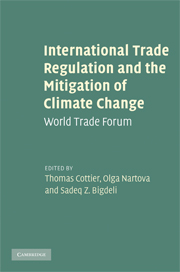Book contents
- Frontmatter
- Contents
- Contributors
- List of figures
- List of tables
- List of abbreviations
- Preface
- PART I Climate change mitigation: scientific, political and international and trade law perspectives
- PART II Climate change mitigation and trade in goods
- PART III Trade in renewable energy sources
- 8 Incentive schemes to promote renewables and the WTO law of subsidies
- 9 The WTO and climate change ‘incentives’
- 10 Certifying biofuels: benefits for the environment, development and trade?
- PART IV Climate change mitigation and trade in services
- PART V Climate change and technology transfer, investment and government procurement: legal issues
- PART VI Institutional challenges and the way forward
- Index
10 - Certifying biofuels: benefits for the environment, development and trade?
from PART III - Trade in renewable energy sources
Published online by Cambridge University Press: 04 August 2010
- Frontmatter
- Contents
- Contributors
- List of figures
- List of tables
- List of abbreviations
- Preface
- PART I Climate change mitigation: scientific, political and international and trade law perspectives
- PART II Climate change mitigation and trade in goods
- PART III Trade in renewable energy sources
- 8 Incentive schemes to promote renewables and the WTO law of subsidies
- 9 The WTO and climate change ‘incentives’
- 10 Certifying biofuels: benefits for the environment, development and trade?
- PART IV Climate change mitigation and trade in services
- PART V Climate change and technology transfer, investment and government procurement: legal issues
- PART VI Institutional challenges and the way forward
- Index
Summary
Introduction
According to the International Energy Agency (IEA) World Energy Outlook reference scenario, economic growth and increasing population will lead to an increase in global energy demand of 1.6 per cent per annum between 2006 and 2030. While it is projected that fossil fuels will remain the dominant source of energy, increasing costs, security concerns and environmental consciousness have motivated countries to explore alternative energy sources.
Countries have begun to consider bioenergy to be a viable alternative to fossil fuels. Biofuels, fuels derived from biomass, are among the bioenergy alternatives which are being considered and are currently viewed, if carefully developed, as one of the means of slowing down the process of global warming and enhancing energy security, as well as possibly providing countries with opportunities to diversify agricultural production and raise rural incomes.
Comparatively low production costs and better climate conditions in the developing world, coupled with limited land capacity in several developed countries to produce the amount of feedstock required to meet the internal demand, are driving an emerging market in biofuels and related feedstocks.
In parallel with the rapidly growing use of biofuels, concerns are being voiced about the sustainability of biofuels and feedstock production and interest in certification schemes to encourage sustainable production is intensifying.
Increased production and use of biofuels raises a number of crucial questions related, inter alia, to land diversion, food security, preservation of biodiversity and water use.
- Type
- Chapter
- Information
- International Trade Regulation and the Mitigation of Climate ChangeWorld Trade Forum, pp. 197 - 228Publisher: Cambridge University PressPrint publication year: 2009



